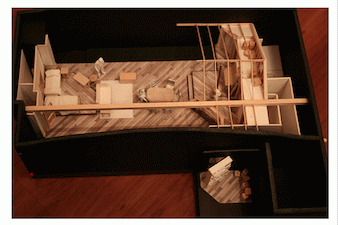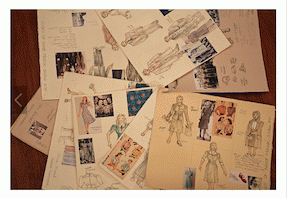New production at Writers Theatre. directed by Kimberly Senior
My guest today is Kimberly Senior, director of Writers Theatre's production of The Diary of Anne Frank.
JB: Welcome to OpEdNews, Kimberly. This is probably the most famous diary of our time, if not of all time. The book has been translated into 67 languages, and the play has been performed thousands of times across the globe over the last fifty years. Isn't that incredibly daunting? What fresh and new can you bring to the mix?
KS: Strangely, I haven't found it daunting. I mean, it seems so important to keep telling this story. I believe we tell stories in an attempt to understand; we hash and rehash to try to come up with an explanation. With Diary, it still makes no sense to us-- the ridiculousness of the cruelty, the fact that they were on the last train to leave Westerboerk. Plus, performing in the space we are in where only 60 people experience the story at the time. They are literally inside the annex! And can see one another watching the play which adds another layer of empathy.
JB: You've just pointed out a few of the perks of such an intimate venue. Let's talk about the set design a bit more. A lot of thought went into that aspect of the production. You could say that the set itself is a character in the play. How did you come up with this specific design and what were you aiming for?
KS: In collaborating with the set designer, Jack Magaw (who also happens to be my husband), we really wanted to take advantage of the close quarters: something that a larger, proscenium house can't achieve as well is the sense of claustrophobia. We began by looking at extant photos and ground plans of the actual annex. Then, we did the best we could to recreate that. The rules that are explicitly outlined - both in the play and in the diary itself - plus the tiny footprint of the space really make for another kind of psychological torture that the Annex residents endured.
JB: As a member of the audience, I can attest to the claustrophobic atmosphere. With all of us crowded in no more than a few feet from the action, there was literally no place to hide - from the emotion, from the story, from anything. The Diary has sold more than 30 million copies over the years, many of them to high school students. But the version that many of us read before the mid-'90s was quite different from the "real" version of the Diary. Tell us more about that, please.
KS: I'm not a total expert on that subject, I hate to say. I really had to commit to making the play that was in front of me, so although I've read the Diary and other source material, I worked primarily from Kesselman's script. I do know that an earlier version was much more sanitized - not really showing some less flattering qualities of Anne, as well as removing some of the more "Jewish" aspects of the play in order to make it more universal. I tend to believe that the universal is found when we get really specific. Some of my favorite stories are of times and places I have never traveled and, through storytelling, I get to see myself in those stories and have greater empathy.
JB: Unlike most books and plays, we all know the outcome before we sit down to read or watch this play. Good and bad timing figure large in this drama as well. The Franks are ratted out after the Allied Normandy invasion but just in time to be on the very last transport from Holland to the concentration camps. Anne dies of typhus shortly before Liberation. Even the diary itself - Anne received it as a birthday gift less than a month before they go into hiding. Time in the Annex is weirdly compressed; it slows to a crawl and yet they are cocooned there - crowded, crabby, worried, but safe - at least until the end. How do you handle the quixotic element of time in your production?
KS: That is a very interesting question. Time is not really marked by clocks or calendars in their world. They have the chiming of the Westertoren until 3/25/1943 and that gave them a sense of time and the outside world. They had the sounds of the office from below the Annex which marked dangerous moments in which they needed to be silent. Life starts to mark time - Anne's menstruation, falling in love with Peter, Miep's visits, occasional holidays. The tension of wanting time to pass - each day could mean the end of the war - and wanting time to stand still - moments of safety and comfort - is something that really drives the tempo of the production.
JB: The playbill for this production was like nothing I'd seen before. Traditionally, playbills contain the standard bios and an article about the specific production. That's about it. This playbill is in a category by itself: it's chock-full of fascinating information. I'd read the Diary as a child; I considered myself pretty familiar with the story and yet, within the playbill pages, I learned a lot about the play, this production and the story behind the Diary. Kudos. How was the decision made to expand this playbill and its basic function?
KS: You'd really have to talk more to the amazing staff at Writers' Theatre about that! I do know that the program for every show at the theater is crafted to perfection - providing both dramaturgical resource as well as personal insight into the work at hand.
(Note: You can view every article as one long page if you sign up as an Advocate Member, or higher).








